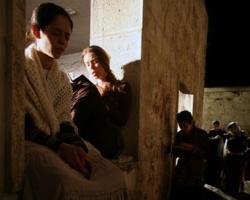They came in waves, ardent Jewish settlers, religious women from central Israel, black-clad followers of Hasidic courts and groups of teenage boys and girls … Crammed into a dozen buses and escorted by the Israeli military, the Jewish pilgrims slid quietly along deserted streets throughout the early hours of a recent morning while the residents of this Palestinian city, a militant stronghold ruled until recently by armed gangs, slept in their beds.
The destination was the holy place known as Joseph’s Tomb, a tiny half-derelict stone compound in the heart of a residential district that many Jews believe is the final burial place of the son of Jacob, the biblical patriarch.
Here, the Israeli-Palestinian conflict is boiled down to its very essence of competing territorial, national and religious claims. The renewed focus on what the Jewish devotees call the pull or power of Joseph appears to reflect a wider trend: a move by the settler movement at large away from tired security arguments and a return to its fundamental raison d’être — the religious conviction that this land is the Jews’ historical birthright and is not up for grabs.




